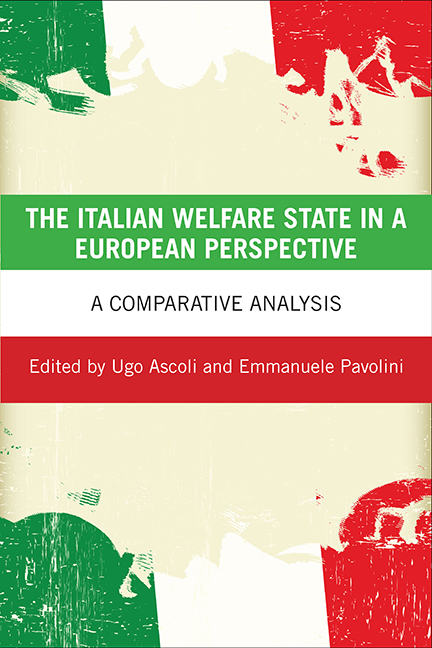four - Italian social assistance in the European context: residual innovation and uncertain futures
Published online by Cambridge University Press: 08 March 2022
Summary
Introduction
Social assistance schemes play a special role within social policies as they are supposed to be the final safety net for people in economic need. They include measures ranging from general policies against poverty to fragmented measures aimed at social inclusion, from exemptions from fees to means-tested support for elderly homecare. This heterogeneity makes it difficult to cover the whole policy spectrum. Moreover, these measures differ in terms of access criteria, generosity, logic and territorial level of regulation. In this chapter, I will try to identify some general trends common to most social assistance domains, focusing, however, my efforts on social assistance sensu stricto and its cash dimension.
In order to address these issues, the chapter is divided into three parts. The first part presents overall trends of paradigmatic shifts within social assistance schemes. The second part presents a synthetic overview of different social assistance models existing in Europe and how they changed, considering the territorial levels that regulate, manage and implement social assistance schemes and the actors involved. Finally, the third part addresses the Italian case framed within this comparative perspective, highlighting its specificities compared to the European context.
What social assistance is and how it changed over time
We usually understand ‘social assistance’ to mean all provisions – both cash and in-kind – that cover a specific need and foresee a means test in order to access them. These conditions are usually verified by administrative staff or social workers. Historically, social assistance measures were the first public policies addressing conditions of need (Alber, 1982). Since their adoption, they have undergone important transformations in their institutional architecture, the actors involved, the foreseen provisions, their degree of legitimacy and in their main regulatory principles.
It is possible to periodise these transformations and analytically identify three main generations. The first generation of social assistance policies dates back to the 17th century (Lis and Soly, 1986), when Elisabeth I adopted the Act for the Relief of the Poor in England. That Act foresaw a tax on the poor and obliged local public authorities to take on responsibility for people in a condition of need. The first of a series of Poor Laws, the Act regulated poverty in a way that benefits were granted only to the poor belonging to the local community (to avoid vagrancy).
- Type
- Chapter
- Information
- The Italian Welfare State in a European PerspectiveA Comparative Analysis, pp. 101 - 132Publisher: Bristol University PressPrint publication year: 2015



